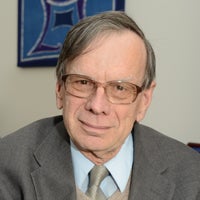- Professor Emeritus
- Phone: 401.874.2226
- Email: fwenisch@uri.edu
Biography
Born in Austria (Neunkirchen/Lower Austria), Dr. Wenisch grew up in Hallein and Salzburg. He attended High School (Bundeslehrerbildungsanstalt) in Salzburg; from 1964-1968, he studied at the University of Salzburg. From 1966-68, he served in a position corresponding to Graduate Assistant there; from 1968-1971, he served in a position perhaps corresponding to Assistant Professor (Hochschulassistent). From 1971 to the present, he has been teaching at the University of Rhode Island, first as Assistant Professor, then as Associate Professor, and finally as Full Professor. From 1974-1991, he served as Philosophy Department Chair (Acting Chair for the first of these years). His chief accomplishment in that position is that he lives to tell about it.
Research
Dr. Wenisch considers himself as belonging to a philosophical movement going back to Edmund Husserl’s publication Logical Investigations (1900/01), called phenomenological realism. The name seems complicated, but the matter is simple: As a form of realism, the movement acknowledges that there is a mind-independent reality (aka “Thing In Itself”) which the human mind can, to a certain extent at least, recognize the way it really is (pace Immanuel Kant). “Phenomenological” is derived from the Greek word “phainomenon,” meaning in this context “What shows itself.” Thus, the philosophical movement he belongs to places an investigation of what is immediately given, what presents itself to the human mind, at the starting point and at the center of philosophical investigations. As far as the history of philosophy is concerned, he is particularly interested in examining thinkers belonging to the movement just described, especially the contributions of Dietrich von Hildebrand. In systematic philosophy, his interests center on ethics, theory of knowledge, and philosophy of religion.
Education
- Habilitation (Philosophy), University of Salzburg, 1975 [Note: This degree confers the venia legendi, that is, the right to teach courses in philosophy at all Austrian universities. It obligates the universities to provide facilities, but it does not obligate them to pay a salary, except for a modest stipend determined by enrollment].
- Ph.D. (Philosophy), University of Salzburg, 1968
- Matura, Bundeslehrerbildungsanstalt Salzburg, 1964
Selected Publications
Judaism, Christianity, and Islam—Differences, Commonalities, and Community. (San Diego: Cognella, 2011 [2012]; Second [expanded] edition 2014 [2015]).
“Self-regarding and non-self-regarding actions, and comments on a non-self-regarding interest in another person’s good,” Quaestiones Disputatae, Vol. 3, No. 2, Franciscan University of Steubenville, Steubenville, 2013, pp. 120-134.
“’Sorting out Feelings’: How I Became a Hildebrandian. Quaestiones Disputatae, Vol. 3, No. 2, Franciscan University of Steubenville, Steubenville, 2013, pp. 120-134.
“In Defense of the Finiteness of the Past—A Belated Response to a Reply,” in El amor a la veridad, toda veridad y in todas las cosas, Festschrift for Josef Seifert (Santiago, Chile: 2010), pp. 211-236).
“‘What Are We to Do, and What May We Hope for?’ A Semi-Kantian Treatment of the Second and the Third of Kant’s Three Big Questions,” Arche—Journal of Philosophy, Department of Philosophy, Novi Sad, 2004, pp. 92-105.

